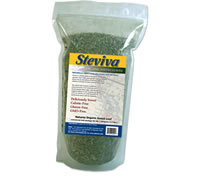What Is Stevia?
Tuesday, 03 July 2012In brief, stevia is a plant, the leaves of which are incredibly sweet. It is native to a number of South American countries, where it has been used for centuries, for medicinal purposes and its unique sweet taste.
More specifically, stevia is a genus of the Asteracae (aka. Compositae) family of sunflowers and tournesols. There exist over 150 species of stevia plant within this genus and only two have sweet properties. Of these Stevia rebaudiana (Bertoni) Bertoni has extraordinarily sweet properties. Although most prevalent in a triangle encompassing Peru, Bolivia, Paraguay, Southern Brazil and Northern Argentina, Stevia rebaudiana is native to a number of countries and is usually found at altitudes between 500 and 3500m above sea level. It typically grows in semi-arid mountainous terrain but habitats can include grasslands, treed mountain slopes, conifer forests and sub-alpine vegetation. In recent years plant geneticists have successfully bred stevia plants with leaves have sweeter properties than the original indigenous varieties and major producers of high-grade stevia extract such as GLG Life Tech Corp. are constantly striving to increase yields of the high quality sweet components of this amazing plant.
The history of the discovery of this plant and its sweet properties in the 19th century falls outside the scope of this article however such information is widely available in journals, reports and reference documents elsewhere, online.
Stevia rebaudiana is a herbaceous perennial plant, however it can be grown as an annual in certain growing regions. Having ‘simple’ opposite leaves and small white flowers with a purple throat, it is usually harvested once 1m in height. Its pollen is highly allergenic. Stevia is most likely to be insect pollinated and its small seeds are wind-dispersed within a hairy pappus.
With the rise in popularity of this plant cultivation has expanded outside its original native regions. It can now be found growing in North America, India, Malaysia, China, South Korea and Japan. Commercial cultivation is aided with the use of greenhouse farms to ensure good germination and seedling growth.
The sweeteness of this stevia plant can be attributed to the production of steviol glycosides in the plant’s leaves. Of principal interest, for their sweetening properties (200 - 300 times sweeter than sugar), are stevioside and rebaudioside A – just two of at least nine different glycosides present in the plant.
In contrast to many of the artificial sweeteners available stevia does not have a chemical aftertaste.
Stevia Products Worldwide
steviadomain.com
© Stevia Domain 2012



 Buy Raw Stevia Leaves
Buy Raw Stevia Leaves